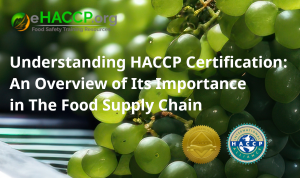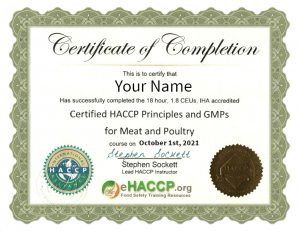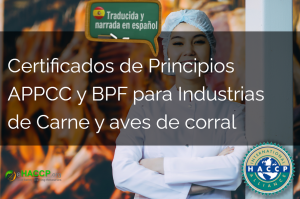Understanding HACCP Certification: An Overview of Its Importance In The Supply Chain
Hazard Analysis and Critical Control Points (HACCP): HACCP certification is essential for ensuring food safety by identifying and controlling potential hazards.
Hazard Analysis and Critical Control Points (HACCP): HACCP certification is essential for ensuring food safety by identifying and controlling potential hazards in the manufacturing process.
They ensure food safety through the analysis and control of biological, chemical, and physical hazards, right from the stages of production, procurement, and handling of raw materials to preparation, distribution, and consumption of the finished products.
By devising a structured HACCP plan, risks related to food safety hazards are meticulously identified, assessed, and mitigated at critical control points.
HACCP certification is not only a testament to a company’s commitment to producing or distributing safe food but also serves as a universal language of trust within the industry. It facilitates smoother trade relations and compliance with international food safety standards. Moreover, it empowers industries across the supply chain by providing them with a framework that helps reduce waste, enhance operational efficiency, and increase consumer confidence in their products.
HACCP certification signals to consumers that a company is committed to producing safe and high-quality food products.
Assured safe food supplies and facilitated better international food trade.
It can help to increase consumer confidence in their products, reduce the risk of product recalls and liability, and improve their overall efficiency and profitability.
In essence, HACCP certification is an indispensable tool for any organization within the supply chain looking to uphold high standards of food safety. It underscores an organization's dedication to quality control and risk management practices that are crucial for safeguarding public health and maintaining the integrity of global food trade.
Conclusion HACCP certification serves as a pivotal tool for elevating food safety standards and protecting consumer health.
When considering HACCP training and certification, it's recommended to choose reputable and accredited organizations. Look for training providers that are recognized by accreditation bodies or institutions that specialize in food safety standards. Accreditation adds credibility to the training program and ensures that it meets internationally accepted standards.
Some well-known and respected organizations that provide HACCP training and certification include:
1. International HACCP Alliance: The International HACCP Alliance provides training programs and certification that are widely recognized in the food industry.
2. eHACCP.org: eHACCP.org offers accredited HACCP training courses and certification.
3. International Association for Food Protection (IAFP): IAFP provides resources and training related to food safety, including HACCP.
4. Local Health Departments and Universities: Some local health departments and universities may offer accredited HACCP training courses.
Before enrolling in any HACCP training program, verify the credentials and accreditation of the organization providing the training. You can check for reviews, testimonials, and whether the certification is recognized in your industry and region.
Additionally, always ensure that the training program aligns with the Codex Alimentarius Commission's HACCP principles and other relevant international standards.
Please note that the availability of specific training programs and certification processes may change over time, so it's recommended to check the latest information directly from the organization's website or contact them for the most accurate details.
It is a critical aspect of maintaining the credibility of a food business, and it significantly contributes to public health and safety.
How HACCP Certification Improves Manufacturing Processes and Quality Control
HACCP (Hazard Analysis Critical Control Points) certification significantly enhances manufacturing processes and quality control across various industries. This systematic preventive approach identifies, evaluates, and controls hazards related to food safety but has implications far beyond, affecting every step of the supply chain from manufacturing to distribution. By integrating HACCP principles, manufacturers can pinpoint potential hazards before they become a threat, ensuring that products are not only safe but also of high quality.
HACCP (Hazard Analysis and Critical Control Points) certification is a recognition awarded to businesses in the food industry that have implemented and maintained a HACCP system.
It is a systematic approach to ensure food safety, which involves identifying, evaluating, and controlling potential hazards in the entire food production process.
HACCP principles have been successfully utilized in sectors such as pharmaceuticals, cosmetics, and manufacturing, where the identification and control of hazards are critical to ensuring product safety and quality.
The certification requires a detailed analysis of the production process, encouraging manufacturers to scrutinize their operations meticulously. This deep dive into processes often reveals inefficiencies or areas for improvement that might have gone unnoticed. By addressing these issues, companies can streamline their operations, reduce waste, and increase productivity.
The process of obtaining HACCP certification involves meticulous scrutiny and adherence to stringent regulatory requirements.
By streamlining operations, companies can optimize their workflow and achieve higher productivity.
Moreover, HACCP's focus on critical control points means that quality control measures are not randomly applied but are strategically placed at stages where they will be most effective. This targeted approach prevents contamination and ensures consistency in product quality. As a result, manufacturers can build greater trust with consumers and partners by demonstrating their commitment to safety and quality through HACCP certification.
The determination of the CCPs is the key stage in a HACCP study, since the final HACCP plan will focus on the control and monitoring of the process at these points.
Therefore, it helps to ensure consistency of product quality.
Consumer Confidence: HACCP certification assures consumers that products meet the highest food safety standards, building trust and loyalty.
Ensuring Food Safety: The Role of HACCP Certification In Distribution And Logistics
Ensuring food safety within the distribution and logistics sector is pivotal, as this stage bridges the gap between production and consumption. The Hazard Analysis Critical Control Point (HACCP) certification plays an indispensable role in this context, offering a systematic preventive approach to food safety that identifies physical, chemical, and biological hazards in production processes that can cause the finished product to be unsafe.
Food logistics plays a strategic role in ensuring the good preservation of food in the various stages of storage, transport, and distribution.
Hazard Analysis and Critical Control Point (HACCP) is a systematic preventive approach to food safety from biological, chemical, and physical hazards in production processes that can cause the finished product to be unsafe.
It designs measurements to reduce these risks to a safe level.
In the realm of distribution and logistics, HACCP certification ensures that organizations are equipped with a clear understanding of potential hazards that might arise during transportation and storage. This includes addressing temperature control issues, cross-contamination risks, and handling procedures that could compromise food safety. By implementing HACCP principles, companies can establish effective monitoring systems at critical points during the distribution process.
HACCP certification requires businesses to have a detailed understanding of their supply chain and the potential hazards associated with their products.
Identifying and addressing any potential issues in the supply chain that could result in food contamination, spoilage, or other food safety issues, is of the utmost importance.
By confidently and methodically identifying critical control points, establishing critical limits, and monitoring CCPs, the HACCP system can help maintain a safe food production process.
This not only helps in preventing contamination but also boosts consumer confidence in their products.
Moreover, HACCP certification aids businesses in complying with international food safety regulations and standards, facilitating smoother market access across borders. It underscores a commitment to maintaining high-quality standards throughout the supply chain, from manufacturing to distribution, underscoring its significance as more than just a regulatory requirement but a competitive advantage in today's global marketplace.
From legal compliance to improved food safety and increased market access, HACCP certification helps businesses to ensure that their products are safe for consumption and to minimize the risk of foodborne illness.
It signifies that a company complies with the established food standards and practices, demonstrating a commitment to maintaining high levels of safety and quality throughout the production, storage, and distribution processes.
From Farm to Fork: How HACCP Certification Safeguards The Entire Supply Chain
The journey of products from farm to fork is a complex process, involving multiple stages of production, processing, and distribution. Each step in this extensive supply chain poses potential hazards that can compromise the safety and quality of goods. Herein lies the significance of Hazard Analysis Critical
Control Points (HACCP) certification—a systematic preventive approach to food safety that identifies, evaluates, and controls hazards from raw material production, procurement, handling, to manufacturing, distribution, and consumption of the finished product.
From farm to fork, numerous individuals are involved in food production, handling, and distribution.
From farm to table, food products can encounter a number of safety hazards throughout their journey along the supply chain.
Hazard Analysis and Critical Control Points (HACCP) is a systematic approach to ensuring food safety by identifying and controlling potential hazards throughout food product production, processing, and distribution.
HACCP certification acts as a safeguard across the entire supply chain by ensuring that businesses not only identify potential food safety hazards but also implement effective control measures at critical points during the process. This proactive approach significantly reduces the risks of foodborne diseases and contamination incidents. For manufacturers and distributors alike, adopting HACCP principles means adhering to high standards of food safety management that transcend national borders—facilitating smoother international trade and bolstering consumer confidence in their products.
For example, HACCP certification may require businesses to assess the food safety processes of their suppliers and to implement controls to prevent food safety hazards.
This systematic approach significantly curbs the likelihood of foodborne illnesses caused by contaminants, improper handling, or storage.
HACCP is universally acknowledged and provides a standardized approach to food safety, facilitating international trade by ensuring that products meet universally accepted safety standards.
Moreover, HACCP certification fosters a culture of continuous improvement within organizations. It encourages industries across the supply chain to regularly review their processes, update their safety protocols as necessary, and remain vigilant against emerging threats—ultimately ensuring that products reaching consumers are not only safe but of consistent quality.
Earning HACCP certification showcases dedication to continuous learning and improvement.
These guidelines lay out the protocols which manufacturers must implement to assure that their products are consistently high-quality from batch to batch and safe for human use, including mandatory product inspection at critical control points.
Maximizing Efficiency and Reducing Risks: The Business Advantages of Obtaining HACCP Certification
In the intricate web of modern supply chains, efficiency and risk management are paramount for businesses to thrive. Obtaining Hazard Analysis Critical
Control Point (HACCP) certification serves as a linchpin in achieving these objectives, particularly for companies spanning manufacturing to distribution.
This globally recognized standard focuses on preventing hazards that could cause food to be unsafe, rather than just identifying and controlling them post-production.
In the food supply chain, good management is vital in helping businesses better understand their customers and in identifying potential risks and opportunities.
HACCP stands for Hazard Analysis and Critical Control Points, a required food safety certification for many food businesses.
By proactively identifying and controlling potential hazards, food manufacturers can effectively prevent foodborne illnesses and ensure product safety.
By implementing HACCP's systematic preventive approach, businesses can significantly streamline their operations.
The process of acquiring HACCP certification compels companies to meticulously analyze their production processes, identifying potential hazard points and implementing rigorous control measures. This proactive approach not only reduces the likelihood of product recalls or regulatory violations—which can be costly and damaging to reputation—but also enhances overall operational efficiency. Companies find that consistent adherence to HACCP principles leads to more predictable production cycles, reduced waste, and improved resource allocation.
The Importance of HACCP Certification HACCP certification is a systematic and preventive approach that identifies, evaluates, and controls potential hazards in food production processes.
By eliminating waste, optimizing inventory management, and improving process efficiency, companies can reduce production costs, minimize the risk of errors, and avoid costly recalls or rework.
Moreover, the systematic approach of HACCP allows for streamlined processes, optimized resource allocation, and reduced product recalls or rejections.
Moreover, in an era where consumers are increasingly concerned about food safety and quality, HACCP certification offers a competitive edge. It reassures customers and partners of a company's commitment to maintaining the highest standards of safety and quality—further solidifying its position in the market. Thus, beyond mere compliance, obtaining HACCP certification is a strategic business move that maximizes efficiency while minimizing risks across the entire supply chain.
Stephen Sockett
eHACCP.org
+1 (866) 488-1410
email us here
Visit us on social media:
Facebook
Twitter
LinkedIn
YouTube
Other
Video overview of eHACCP.org. Online HACCP training and certification for food companies; producers, processors / manufacturers, meat and poultry, seafood, etc.
Legal Disclaimer:
EIN Presswire provides this news content "as is" without warranty of any kind. We do not accept any responsibility or liability for the accuracy, content, images, videos, licenses, completeness, legality, or reliability of the information contained in this article. If you have any complaints or copyright issues related to this article, kindly contact the author above.



